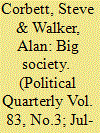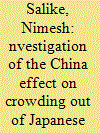| Srl | Item |
| 1 |
ID:
160858


|
|
|
|
|
| Summary/Abstract |
Previous studies have investigated whether Chinese exports have crowded out those from other countries. However, what has yet to be considered is the evidence based on different quality varieties. Using the most detailed Harmonized System 9‐digit product‐level data, the present paper provides evidence of crowding‐out and crowded‐out effects across different product quality segments and across manufacturing sectors by quality segments. The empirical evidence presented in this paper shows that the crowding‐out effects of Chinese exports have been greatest at the lower end of the quality spectrum but less significant at the higher quality spectrum. Moreover, since 2007, China's own exports of lower quality manufactured goods have been increasingly crowded out. The key policy implication is that China's export path is in line with that taken by other Asian economies in previous decades; the crowded‐out effect could achieve win–win outcomes for countries involved; and lower income countries would do well to be open to receive those relocated low value‐added industries from China. However, the relocation policy in China is best implemented gradually as climbing up the product quality ladder takes time.
|
|
|
|
|
|
|
|
|
|
|
|
|
|
|
|
| 2 |
ID:
117485


|
|
|
|
|
| Publication |
2012.
|
| Summary/Abstract |
This article contributes to the steady flow of critiques of the big society idea contained in The Political Quarterly. It focuses chiefly on two sets of parallels. The first is between the big society and the policies pursued by the Thatcher government which, despite their obvious rhetorical differences, contain many striking similarities, including their neoliberal origins, application of the 'crowding out' thesis and uncritically idealised notions of community. The second is between the big society and a policy with the same name pursued doggedly by the Chinese Communist Party for nearly 20 years until being abandoned as a failure. Lessons for the Prime Minister's flagship policy are drawn from the Chinese experience. The article concludes with a welcome for the rediscovery of the social by public policy and some suggestions as to how a more participative and democratic state could follow from this breakthrough.
|
|
|
|
|
|
|
|
|
|
|
|
|
|
|
|
| 3 |
ID:
176778


|
|
|
|
|
| Summary/Abstract |
Rapid structural change towards a low-carbon energy supply requires significant additional investments into innovative but high-risk low-carbon technologies. Mobilising greater private investments requires applying the right policy instruments, but while fiscal measures and regulation have been well researched, systematic quantitative evidence about the effect of public direct investment is lacking. Absent empirical evidence, contradictory theoretical arguments claim that such public (co-)investments either ‘crowd out’ or ‘crowd in’ private investors. In this paper we show that the macroeconomic concept of crowding out/in is inapplicable to sectoral studies such as of renewable electricity. Instead, both neoclassical microeconomics and evolutionary economics suggest public direct investment to have a positive effect due to either externalities or market creation effects. We also provide the first quantitative estimate of the effect of public direct investment on private investment into renewable electricity technologies for 17 countries in the period 2004–2014. Using FGLS and static and dynamic GMM estimators, we find that public investments not only have a positive but also consistently the largest effect on private investment flows relative to feed-in tariffs, taxes and renewable portfolio standards in general, and for wind and solar technologies separately. Implications for policy aimed at accelerating the low-carbon transition are discussed.
|
|
|
|
|
|
|
|
|
|
|
|
|
|
|
|
| 4 |
ID:
101159


|
|
|
|
|
| Publication |
2010.
|
| Summary/Abstract |
This paper applies a dynamic panel model to investigate whether China is crowding out Japanese foreign direct investment (FDI) from other economies of Asia. We examined this with industry-level data on Japanese FDI flows into Asian economies. In order to deal with possible problems of serial correlation and endogeneity, we estimated coefficients using a difference and system generalized method of moments to examine the "China effect" on industries. We found a significantly high degree of crowding out effect by China on its Asian counterparts. Among twelve industries, a crowding out effect was found in nine industries, including electrical & electronics-the biggest industry for Japanese FDI. However, a complementary effect was found in two industries, one of them being transport, which is the second biggest industry for Japanese FDI. We conclude that while China's rise is a prominent threat for the region, it could be transformed into an opportunity in vertically fragmented industries.
|
|
|
|
|
|
|
|
|
|
|
|
|
|
|
|
| 5 |
ID:
122715


|
|
|
|
|
| Publication |
2013.
|
| Summary/Abstract |
Green certificates are the main instrument for promoting renewable electricity (RES-E) in Sweden. But certificates cover only a limited share of total RES-E production. Under partial coverage, crowding out may arise whereby costly new RES-E replaces inexpensive old RES-E. Granting certificates to all of RES-E production improves efficiency, but leaves windfall rent to otherwise profitable facilities. We also analyze transaction costs in the permit process for new RES-E in Sweden. Municipalities veto socially desirable projects because of asymmetrically distributed investment costs and benefits. We propose market-based permit fees rather than limited veto rights as a solution to this NIMBY problem.
|
|
|
|
|
|
|
|
|
|
|
|
|
|
|
|